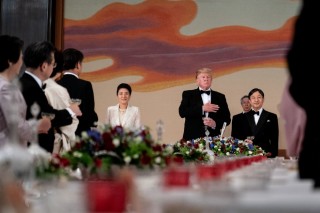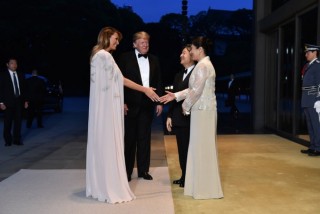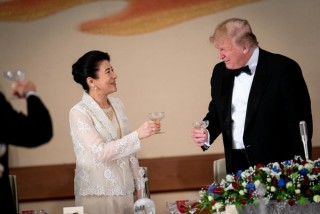Loading
Search
▼ With Trump’s Visit to Japan, Empress Masako Finds a Spotlight
- Category:Event
TOKYO — On Sunday night, men in loincloths and samurai topknots stole the limelight from the president of the United States. On Monday, the new empress of Japan was the star.
When the new Japanese emperor, Naruhito, and his wife, Masako, welcomed President Trump and the first lady, Melania Trump, to the palace on Monday morning during their four-day state visit, Masako, a multilingual former diplomat and Harvard graduate, became an instant hit on social media.
The Japanese public marveled as she spoke fluently in English to Mrs. Trump — even though the emperor also spoke English to Mr. Trump until an official urged him to introduce his interpreter.
“Masako sama can speak five languages,” one Twitter user wrote in a widely shared post, using an honorific term of address. “She is awesome and cool. I admire her. I hope she will demonstrate her ability more and more.”
And the image of Masako chatting with Mr. Trump suggested to some that she will be able to use her diplomatic skills to help advance Japan’s soft power and perhaps even stake out a new role for women in the deeply patriarchal imperial family.
When the new Japanese emperor, Naruhito, and his wife, Masako, welcomed President Trump and the first lady, Melania Trump, to the palace on Monday morning during their four-day state visit, Masako, a multilingual former diplomat and Harvard graduate, became an instant hit on social media.
The Japanese public marveled as she spoke fluently in English to Mrs. Trump — even though the emperor also spoke English to Mr. Trump until an official urged him to introduce his interpreter.
“Masako sama can speak five languages,” one Twitter user wrote in a widely shared post, using an honorific term of address. “She is awesome and cool. I admire her. I hope she will demonstrate her ability more and more.”
And the image of Masako chatting with Mr. Trump suggested to some that she will be able to use her diplomatic skills to help advance Japan’s soft power and perhaps even stake out a new role for women in the deeply patriarchal imperial family.
“The shining smile of Masako sama is gleaming!” wrote one Twitter user. “Brilliant! She’s such a brilliant person. Ah, I really think that Masako sama’s stage is here! Diplomacy!”
Many Japanese, but especially women, saw the international debut of Masako, 55, who has been married to Naruhito for 26 years, as a chance — finally — for her to use her training and experience after spending years trapped in her role as the woman whose primary mission was to produce an heir to the throne.
“I think she is going to be coming into her own,” said Mihoko Suzuki, director of the Center for the Humanities at the University of Miami, who has written about women in monarchies.
But the empress faces many obstacles in defining her own role in Japanese public life because strict codes dictate what she can and cannot do.
Under the Imperial Household Law, which governs most matters of protocol related to Japan’s monarchy, Masako was not even permitted to attend the sacred ascension ceremony for her husband this month. Women are not allowed to sit on the throne.
Many Japanese, but especially women, saw the international debut of Masako, 55, who has been married to Naruhito for 26 years, as a chance — finally — for her to use her training and experience after spending years trapped in her role as the woman whose primary mission was to produce an heir to the throne.
“I think she is going to be coming into her own,” said Mihoko Suzuki, director of the Center for the Humanities at the University of Miami, who has written about women in monarchies.
But the empress faces many obstacles in defining her own role in Japanese public life because strict codes dictate what she can and cannot do.
Under the Imperial Household Law, which governs most matters of protocol related to Japan’s monarchy, Masako was not even permitted to attend the sacred ascension ceremony for her husband this month. Women are not allowed to sit on the throne.
“The Japanese public is so excited and it seems like they are very much expecting Masako to take advantage of her previous career as a diplomat,” said Kumiko Nemoto, a professor of sociology at Kyoto University of Foreign Studies. “I’m sure she understands that there are lots of forces she needs to take account of and not overstep certain boundaries.”
Because the Imperial Household Agency, which manages the imperial family’s every move, is one of the most traditional institutions in Japan and is dominated by mostly older Japanese men, “they expect Masako the empress to behave with always a certain smile and a very subservient type of womanhood,” Ms. Nemoto said.
Monday’s banquet was not Masako’s first time sitting next to an American president. Just a month after her wedding in 1993, the public swooned when she sat between President Bill Clinton and President Boris N. Yeltsin of Russia at a state dinner in Tokyo and conversed easily with both in their own languages.
But before long, the Japanese news media became consumed by one question: when Masako would have a child.
Even after her daughter, Princess Aiko, was born in 2001, the Imperial Household Agency prohibited Masako from traveling abroad in case that would interfere with her ability to get pregnant again, prompting her to sink into depression and withdraw from public appearances altogether.
At a 2004 news conference, Naruhito, who was then the crown prince, implicitly criticized the palace agency for placing so many restrictions on his wife.
“I think it would be better if Princess Masako could go out with a little more freedom and be able to do a variety of things,” he said.
As empress, Masako is likely to travel more freely. Her mother-in-law, Michiko, rarely left the side of Naruhito’s father, Akihito, who abdicated the throne at the end of April.
Some analysts say Masako could carve out an independent role by championing causes she cares about rather than simply accompanying the emperor everywhere.
“Now the role of women is more independent,” said Mari Miura, a professor of political science at Sophia University in Tokyo. “Women have separate jobs from wives and mothers, so why shouldn’t Masako do that?”
But in addition to the constraints of the monarchy, Masako also faces the same social pressures as her fellow countrywomen.
“It’s desirable that women’s advancement in society is making progress,” Lully Miura, a political scientist who runs the Yamaneko Research Institute, wrote in an essay in the June edition of Bungei Shunju, a monthly magazine.
“But women still take on a large part of delivering and raising children,” she added. “So dependable women tend to play the roles of wife and mother perfectly.”
The emperor has been open about his wife’s struggles with depression and has said that her ability to perform her public duties could be affected by her mental health.
With her first appearance as empress, the Japanese news media has seized on Masako’s apparent sunny disposition and declared that she appears much happier than she has in years.
It is an alluring narrative, analysts say, but the situation is not so simple.
“People do sympathize with her and they very much want her to be the Japanese princess who has the successful happy ending after all the trials she went through,” said Kathryn Tanaka, an associate professor of cultural and historical studies at Otemae University in Nishinomiya. “Everyone is cheering for her and rooting for her and wanting her to have this kind of happy ending. It may be something where the public has to accept what she’s able to do.”
Because the Imperial Household Agency, which manages the imperial family’s every move, is one of the most traditional institutions in Japan and is dominated by mostly older Japanese men, “they expect Masako the empress to behave with always a certain smile and a very subservient type of womanhood,” Ms. Nemoto said.
Monday’s banquet was not Masako’s first time sitting next to an American president. Just a month after her wedding in 1993, the public swooned when she sat between President Bill Clinton and President Boris N. Yeltsin of Russia at a state dinner in Tokyo and conversed easily with both in their own languages.
But before long, the Japanese news media became consumed by one question: when Masako would have a child.
Even after her daughter, Princess Aiko, was born in 2001, the Imperial Household Agency prohibited Masako from traveling abroad in case that would interfere with her ability to get pregnant again, prompting her to sink into depression and withdraw from public appearances altogether.
At a 2004 news conference, Naruhito, who was then the crown prince, implicitly criticized the palace agency for placing so many restrictions on his wife.
“I think it would be better if Princess Masako could go out with a little more freedom and be able to do a variety of things,” he said.
As empress, Masako is likely to travel more freely. Her mother-in-law, Michiko, rarely left the side of Naruhito’s father, Akihito, who abdicated the throne at the end of April.
Some analysts say Masako could carve out an independent role by championing causes she cares about rather than simply accompanying the emperor everywhere.
“Now the role of women is more independent,” said Mari Miura, a professor of political science at Sophia University in Tokyo. “Women have separate jobs from wives and mothers, so why shouldn’t Masako do that?”
But in addition to the constraints of the monarchy, Masako also faces the same social pressures as her fellow countrywomen.
“It’s desirable that women’s advancement in society is making progress,” Lully Miura, a political scientist who runs the Yamaneko Research Institute, wrote in an essay in the June edition of Bungei Shunju, a monthly magazine.
“But women still take on a large part of delivering and raising children,” she added. “So dependable women tend to play the roles of wife and mother perfectly.”
The emperor has been open about his wife’s struggles with depression and has said that her ability to perform her public duties could be affected by her mental health.
With her first appearance as empress, the Japanese news media has seized on Masako’s apparent sunny disposition and declared that she appears much happier than she has in years.
It is an alluring narrative, analysts say, but the situation is not so simple.
“People do sympathize with her and they very much want her to be the Japanese princess who has the successful happy ending after all the trials she went through,” said Kathryn Tanaka, an associate professor of cultural and historical studies at Otemae University in Nishinomiya. “Everyone is cheering for her and rooting for her and wanting her to have this kind of happy ending. It may be something where the public has to accept what she’s able to do.”
- May 28, 2019
- Comment (0)
- Trackback(0)




